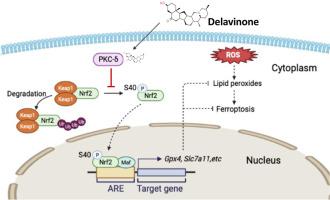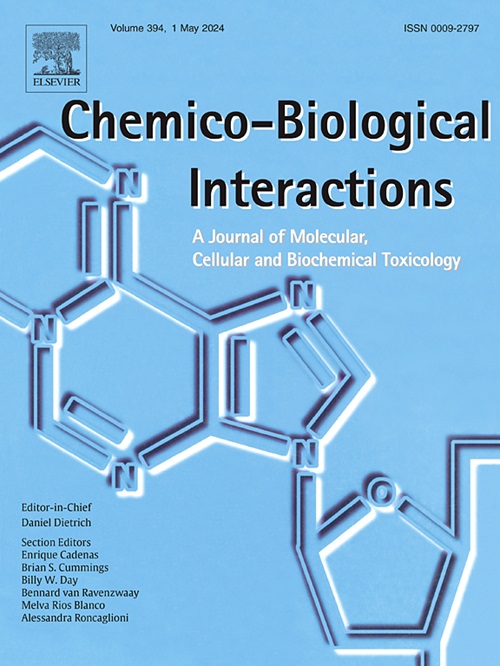Delavinone elicits oxidative stress and triggers ferroptosis in colorectal cancer by inhibiting PKCδ-mediated phosphorylation of Nrf2
IF 4.7
2区 医学
Q1 BIOCHEMISTRY & MOLECULAR BIOLOGY
引用次数: 0
Abstract
Ferroptosis is a potential therapeutic approach for colorectal cancer (CRC). Studies have shown that peimine and its analogs exhibit anti-cancer potential; however, the intricate relationship between ferroptosis and their efficacy in fighting CRC remains unclear. In this study, we attempted to assess the therapeutic impact of peimine and its analogs on CRC and unravel the underlying mechanisms. CRC cells and a DSS/AOM-induced CRC mouse model were employed for in vitro and in vivo experiments, molecular interactions and co-immunoprecipitation were used to identify target proteins. Among the compounds, delavinone significantly inhibited CRC cell proliferation and increased cellular lipid ROS levels, MDA accumulation, and GSH depletion; the ferroptosis inhibitors DFO and Fer-1 ameliorated delavinone-induced cell death. Mechanistically, delavinone impedes PKCδ-mediated Nrf2 phosphorylation by inhibiting the kinase activity of PKCδ, thereby decreasing Nrf2 nuclear translocation and downstream GSH synthesis-related gene expression. overexpression of GPX4 weakened the anticancer effect of delavinone, underscoring delavinone's inhibition of the PKCδ/Nrf2/GPX4 signaling axis and induction of ferroptosis in CRC cells. Consistent with in vitro findings, delavinone notably hindered AOM/DSS-induced colorectal carcinogenesis, exhibiting a pronounced pro-ferroptosis effect on CRC. This study delineates that delavinone exerts its anticancer activity by inducing ferroptosis through PKCδ inhibition, consequently reducing Nrf2 phosphorylation. These findings position delavinone as a promising candidate for CRC treatment.

地拉韦酮通过抑制PKCδ介导的Nrf2磷酸化,在结直肠癌中引发氧化应激和铁变态反应。
铁突变是治疗结直肠癌(CRC)的一种潜在方法。研究表明,培美因及其类似物具有抗癌潜力;然而,铁突变与它们抗击 CRC 的功效之间错综复杂的关系仍不清楚。在本研究中,我们试图评估培美因及其类似物对 CRC 的治疗效果,并揭示其潜在机制。研究采用了CRC细胞和DSS/AOM诱导的CRC小鼠模型进行体内外实验,并利用分子相互作用和共免疫沉淀来鉴定靶蛋白。在这些化合物中,地拉韦酮能显著抑制CRC细胞增殖,并增加细胞脂质ROS水平、MDA积累和GSH消耗;铁突变抑制剂DFO和Fer-1能改善地拉韦酮诱导的细胞死亡。从机理上讲,地拉韦酮通过抑制PKCδ的激酶活性阻碍了PKCδ介导的Nrf2磷酸化,从而降低了Nrf2的核转位和下游GSH合成相关基因的表达。GPX4的过表达削弱了地拉韦酮的抗癌作用,凸显了地拉韦酮对PKCδ/Nrf2/GPX4信号轴的抑制作用以及对CRC细胞铁蜕变的诱导作用。与体外研究结果一致,地拉韦酮明显阻碍了AOM/DSS诱导的结直肠癌发生,对CRC表现出明显的促铁细胞生成作用。这项研究表明,二黄酮通过抑制 PKCδ,从而降低 Nrf2 的磷酸化,诱导铁变态反应,从而发挥其抗癌活性。这些研究结果表明,地拉韦酮有望成为治疗 CRC 的候选药物。
本文章由计算机程序翻译,如有差异,请以英文原文为准。
求助全文
约1分钟内获得全文
求助全文
来源期刊
CiteScore
7.70
自引率
3.90%
发文量
410
审稿时长
36 days
期刊介绍:
Chemico-Biological Interactions publishes research reports and review articles that examine the molecular, cellular, and/or biochemical basis of toxicologically relevant outcomes. Special emphasis is placed on toxicological mechanisms associated with interactions between chemicals and biological systems. Outcomes may include all traditional endpoints caused by synthetic or naturally occurring chemicals, both in vivo and in vitro. Endpoints of interest include, but are not limited to carcinogenesis, mutagenesis, respiratory toxicology, neurotoxicology, reproductive and developmental toxicology, and immunotoxicology.

 求助内容:
求助内容: 应助结果提醒方式:
应助结果提醒方式:


